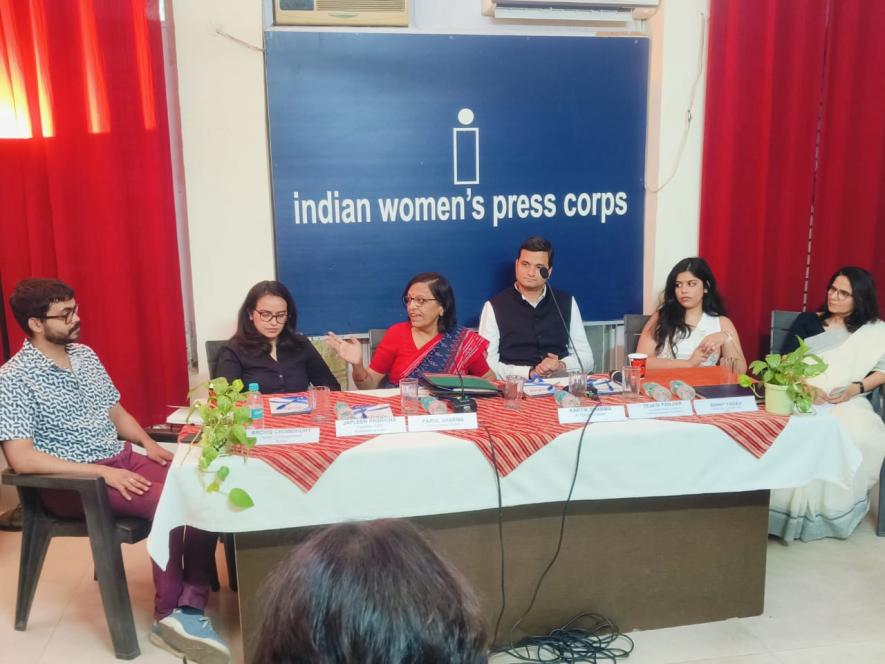‘AI Can Influence Elections in Good and Bad Ways’

A panel discussion on 'Impact of AI in Elections' was held in IWPC on Tuesday, April 23, 2024. (Image Credit: IWPC)
New Delhi: Elections for the 18th Lok Sabha are underway in seven phases across the country. The first phase of polling was on April 19. Amid a high-decibel campaign, can technology like Artificial Intelligence (AI) influence the electoral process. and if yes then how?
To understand this, a panel discussion was held at by Indian Women’s Press Corps in the capital on Tuesday, April 23, with a young panel throwing light on the positives and negatives of AI use in election campaign. The discussion also spoke about how women candidates were the most vulnerable victims of deepfakes in a patriarchal society.
The panelists were Archis Chowdhury, senior Correspondent, Boom, Japleen Pasricha, Founder-CEO, Feminism in India, Kartik Sharma, AI Thought Leader, and Tejasi Panjiar, Associate Policy Counsel, Internet Freedom Foundation.
One thing that came out during the discussion was that AI has been in use for some time but with the advent of Generative AI, it has had a greater impact on the election process, which has both positive and negative aspects. The biggest impact of Generative AI is that it has revolutionised information processing. At the same time, when misinformation or deepfakes start going viral, it is very difficult to trace its origin.
According to BOOM’s Chowdhury, the impact of Generative AI can already be seen in the ongoing elections and may even happen closer to the voting dates.
"These tools can be used by political parties as part of a disinformation campaign. The growing trend of deep fakes can be misused to spread misinformation without any accountability," he added.
Pasricha pointed out that “AI and online abuse are also interconnected and journalists are at greater risk of facing abuse”.
She said all forms of AI technology where “double edged” and had negative sides, including trolling. “AI Deep Fake impacts women the most”, she said, adding that there should be proper mechanisms to stop hate speech and abuse.
Pasricha said that “social media companies should have corrective measures for such things even before these technologies are rolled out,” while adding that the danger for women was greater, as the internet is only a reflection of the larger society, which is still steeped in gender bias.
Sharma pointed out that AI can be used very effectively during elections, in terms of data usage, studying demographics and tailoring campaigns accordingly. It can also help political parties and leaders in scaling up self-image, but the biggest threat is of impersonation.
“In case of deepfake content, it becomes difficult to track the source of content creators due to vague IT laws. The definition of Generative AI is not clear due to which it becomes a problem in putting accountability”, he added.
Panjiar, while noting the divisive election campaign this year, said media has a big role to play as AI could also have grave consequences on media legitimacy. She also said the IT ministry’s policy on threat of deepfakes was deeply flawed, “Political parties must have accountability also”, she said, as also platforms and users, who need to be more diligent before forwarding content that could be damaging.
IWPC president Parul Sharma, while emphasising the importance of AI use, said it can evoke both fascination and fear, and requires a deeper understanding and knowledge of AI, especially its use during elections.
The discussion was followed by a Q &A session moderated by IWPC general secretary Binny Yadav, leading to a general consensus on the need for more tools to understand AI and wider public consultations on a law to deal with the challenges ahead as media professionals, content creators, women, political parties, elections etc.
Get the latest reports & analysis with people's perspective on Protests, movements & deep analytical videos, discussions of the current affairs in your Telegram app. Subscribe to NewsClick's Telegram channel & get Real-Time updates on stories, as they get published on our website.














